The demand for moisture-resistant packaging in the USA is expected to grow from USD 10.2 billion in 2025 to USD 15.6 billion by 2035, reflecting a CAGR of 4.3%. Moisture-resistant packaging plays a crucial role in maintaining product quality and shelf life, particularly in industries such as food, pharmaceuticals, electronics, and cosmetics, where moisture exposure can significantly degrade product integrity. As consumers increasingly prioritize products with longer shelf life and stability, demand for packaging solutions that protect against moisture is expected to rise. The packaging sector is also evolving with advancements in smart packaging technologies, such as moisture-absorbing materials and controlled environment packaging, driving continued market growth.
The growing trend towards sustainable packaging is further supporting the demand for moisture-resistant packaging solutions. The shift toward eco-friendly materials like biodegradable films and recyclable packaging with moisture resistance properties is gaining traction. This shift is being driven by both consumer preference for sustainable products and regulatory pressure on reducing plastic waste. As industries such as food and beverage and pharmaceuticals continue to focus on product protection, quality assurance, and environmental impact, the demand for moisture-resistant packaging will remain strong over the forecast period.
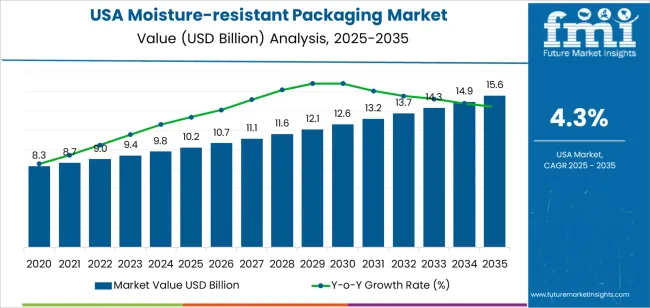
From 2025 to 2030, the demand for moisture-resistant packaging in the USA will grow from USD 10.2 billion to USD 12.6 billion, contributing an increase of USD 2.4 billion. This period will see accelerated growth driven by the adoption of advanced moisture-resistant materials in packaging solutions. Industries such as food and beverage, pharmaceuticals, and consumer electronics will continue to require high-performance packaging to protect products from moisture-related degradation. The market will benefit from increased consumer demand for packaging that extends product shelf life and preserves quality. The introduction of smart packaging technologies, such as moisture-absorbing films and smart seals, will further drive adoption during this phase. The Rolling CAGR during this period will be relatively strong, as moisture-resistant packaging becomes a critical component for businesses looking to improve product quality and consumer satisfaction.
From 2030 to 2035, the market will grow from USD 12.6 billion to USD 15.6 billion, adding USD 3 billion in value. The growth rate will moderate slightly but will still maintain steady momentum driven by technological improvements and the wider adoption of sustainable packaging solutions. The need for moisture-resistant packaging will continue to rise, particularly in regulated industries like pharmaceuticals and food packaging, where product integrity and safety are of paramount importance. The Rolling CAGR during this period will reflect a slower acceleration, as the market matures and the adoption of eco-friendly, high-performance packaging becomes more widespread across various sectors. The increasing focus on sustainability and eco-conscious packaging solutions will continue to contribute to the market's growth despite a slight deceleration.
| Metric | Value |
|---|---|
| Industry Sales Value (2025) | USD 10.2 billion |
| Industry Forecast Value (2035) | USD 15.6 billion |
| Industry Forecast CAGR (2025-2035) | 4.3% |
Demand for moisture resistant packaging in the USA is increasing as manufacturers across food & beverage, electronics, pharmaceuticals and personal care sectors seek packaging solutions that safeguard products from humidity, spoilage, moisture ingress and quality degradation. The proliferation of e commerce and long distance shipping has elevated the need for durable packaging formats that protect goods during transit and storage in varying climate conditions. North America is reported to lead global demand for moisture resistant packaging.
Another significant driver is the rising emphasis on sustainability and product shelf life extension. Brands are investing in barrier films, laminated materials, high performance coatings and multi layer structures that combine moisture protection with recyclable or reusable credentials. Innovation in eco friendly moisture barrier materials is also gaining momentum. At the same time, challenges such as higher cost of advanced materials, complexity of recycling multi layer constructions, and competition from alternative packaging formats may limit rapid adoption. Nonetheless, the convergence of logistics demands, product quality standards and sustainability imperatives suggests that demand for moisture resistant packaging in the USA will continue to grow steadily.
The demand for moisture-resistant packaging in the USA is primarily driven by material and packaging type. The leading material is glass, which accounts for 32% of the market share, while the dominant packaging type is bags and pouches, capturing 35% of the demand. Moisture-resistant packaging is crucial in industries such as food and beverage, pharmaceuticals, and personal care, where protecting products from humidity and moisture is essential to maintaining quality, shelf life, and effectiveness.
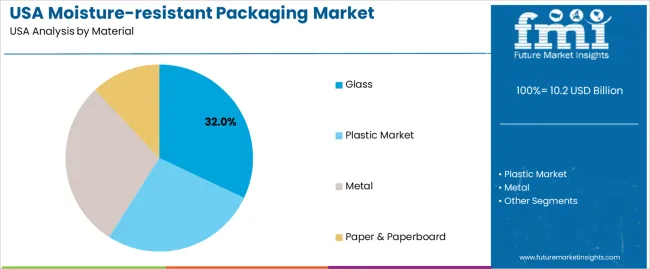
Glass is the leading material for moisture-resistant packaging in the USA, holding 32% of the demand. Glass is a preferred choice for packaging moisture-sensitive products due to its inherent ability to create a tight seal that prevents moisture from entering. Glass containers, such as bottles and jars, are commonly used in industries like food, beverages, and pharmaceuticals, where maintaining the integrity of the product is paramount.
The demand for glass packaging is driven by its strength, chemical resistance, and non-porous nature, which makes it an ideal material for products that require protection from moisture. Glass is also widely regarded as a premium material for packaging due to its aesthetic appeal and recyclability. As consumer preference for eco-friendly and sustainable packaging continues to grow, glass is expected to maintain its strong position in the moisture-resistant packaging market in the USA.
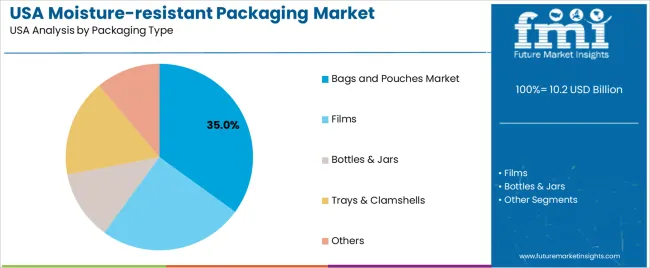
Bags and pouches are the leading packaging type for moisture-resistant packaging in the USA, capturing 35% of the demand. Bags and pouches are commonly used in the packaging of food, snacks, pharmaceuticals, and other moisture-sensitive products. These flexible packaging options are often made from materials like plastic or foil laminates, which provide an effective barrier against moisture, oxygen, and contaminants.
The popularity of bags and pouches is driven by their versatility, lightweight nature, and cost-effectiveness, making them ideal for packaging a wide variety of products. They also offer excellent sealing properties, which help maintain product freshness and shelf life. As the demand for convenient, space-efficient, and moisture-resistant packaging continues to rise, particularly in the food and beverage industry, bags and pouches will remain a dominant choice for manufacturers and consumers alike.
What Are the Primary Growth Drivers for Moisture Resistant Packaging Demand in the United States? Several key drivers underpin the U.S. market. First, the food and beverage industry’s growth in ready to eat, frozen, snack and meal kit offerings places a premium on packaging that controls moisture ingress or loss to preserve shelf life. Second, exponential growth in e commerce and direct to consumer fulfilment demands packaging that can withstand variable transit conditions and protect items from moisture, condensation or ambient exposure. Third, the pharmaceutical and electronics sectors require high barrier moisture protection for sensitive products, increasing demand for advanced film and foil structures. Fourth, the consumer and brand focus on sustainability is prompting packaging suppliers to offer moisture resistant formats incorporating recyclable or bio based materials, expanding applicability.
What Are the Key Restraints Affecting Moisture Resistant Packaging Demand in the United States? Despite favourable conditions, there are important restraints to consider. The cost of high barrier materials and specialised manufacturing (multi layer films, foil laminates) is higher than standard packaging, which may limit adoption in cost sensitive segments. Additionally, the complexity of recycling multi material barrier structures complicates circular economy efforts and may reduce appeal in sectors prioritising sustainability. Supply chain disruptions in key raw materials (such as specialty polymers, foil substrates) can increase costs and reduce responsiveness. Finally, some product categories may remain served by conventional packaging because the incremental benefit of moisture protection is not yet fully monetised.
What Are the Key Trends Shaping Moisture Resistant Packaging Demand in the United States? Major trends include the increasing use of recyclable or mono material high barrier structures that aim to balance moisture protection with recyclability. There is also growth in smart or functional packaging systems that incorporate moisture indicators, active desiccants or micro moisture control layers to optimise product shelf life. Flexible formats such as pouches and stand up bags are increasingly favoured for moisture sensitive foods and snacks, enhancing portability and storage efficiency. Additionally, packaging designers are integrating premium aesthetics (texture, matte/soft touch finishes) with functional barrier performance to meet both protection and branding demands.
The demand for moisture-resistant packaging in the USA is driven by its critical role in protecting products from moisture damage during storage, transportation, and display. Moisture-resistant packaging is essential in industries such as food, pharmaceuticals, electronics, and chemicals, where exposure to moisture can compromise product quality, shelf life, and safety. As consumers and businesses become more concerned with product integrity and longevity, the need for packaging solutions that safeguard against moisture has risen. In particular, the growing trend of e-commerce, increased focus on sustainable packaging, and advancements in moisture-barrier materials are further fueling this demand. Additionally, regulatory requirements regarding product safety, especially for food and pharmaceutical products, are contributing to the increased use of moisture-resistant packaging across various sectors. Below is an analysis of the demand for moisture-resistant packaging across different regions in the USA.
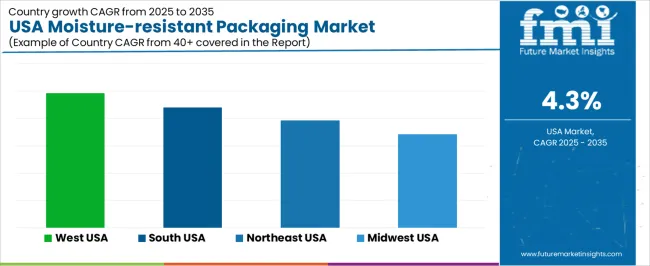
| Region | CAGR (2025-2035) |
|---|---|
| West | 4.9% |
| South | 4.4% |
| Northeast | 3.9% |
| Midwest | 3.4% |
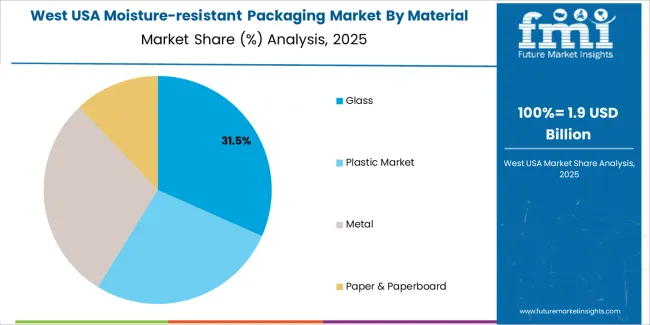
The West leads the demand for moisture-resistant packaging in the USA with a CAGR of 4.9%. This can be attributed to the region's strong presence in industries like food processing, pharmaceuticals, electronics, and e-commerce. States like California and Washington are major hubs for the food and beverage industries, which rely heavily on moisture-resistant packaging to maintain product quality, especially for perishable goods. Additionally, the West’s booming e-commerce sector has driven the need for packaging solutions that protect products from moisture damage during transit.
The region's focus on sustainability and innovative packaging solutions also plays a role, as businesses increasingly turn to eco-friendly moisture-resistant packaging materials to meet consumer preferences for both high-performance and environmentally responsible products. As the West continues to lead in technological advancements and industry regulations that prioritize product safety and packaging quality, the demand for moisture-resistant packaging remains strong.
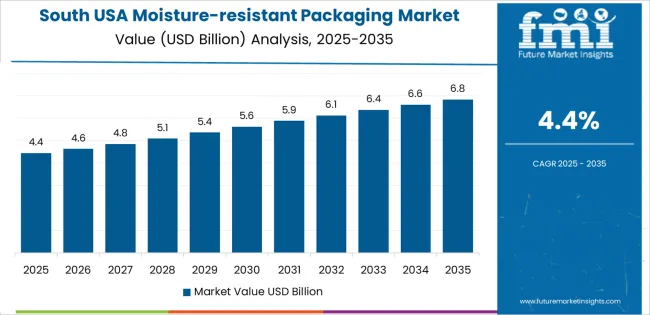
The South shows strong demand for moisture-resistant packaging with a CAGR of 4.4%. The region’s growing manufacturing base, particularly in industries such as food production, chemicals, and pharmaceuticals, contributes to the increasing need for packaging solutions that protect products from moisture damage. States like Texas, Georgia, and Florida are home to numerous facilities that require moisture-resistant packaging to maintain the integrity and shelf life of various products, particularly in the food and beverage sector.
The rise of e-commerce and the increasing consumer preference for products with extended shelf life further support the demand for moisture-resistant packaging in the South. Additionally, the region’s push for more sustainable packaging options has led to a greater emphasis on moisture-resistant materials that are both effective and environmentally friendly. As industries in the South continue to innovate in packaging, the demand for moisture-resistant solutions will remain robust.
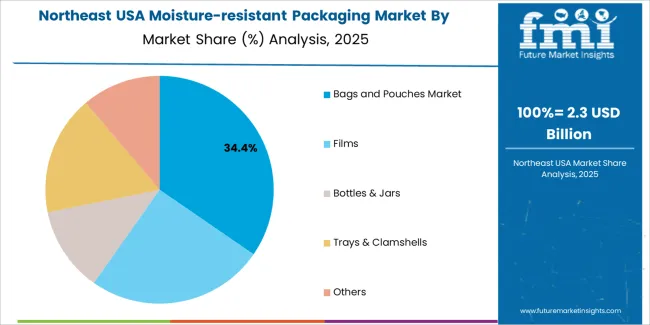
The Northeast shows steady demand for moisture-resistant packaging with a CAGR of 3.9%. This region has a well-established food processing and pharmaceutical manufacturing sector, where moisture-resistant packaging is critical for maintaining product quality, particularly for health-related products and perishable foods. States like New York, New Jersey, and Pennsylvania are major centers for the pharmaceutical industry, and their reliance on moisture-resistant packaging continues to drive steady demand.
Despite a slightly slower growth rate compared to the West and South, the steady demand in the Northeast is driven by the ongoing need for packaging solutions that can withstand the challenges of moisture exposure, especially in sensitive products. The increasing focus on product safety, coupled with the region’s strong manufacturing capabilities, ensures continued adoption of moisture-resistant packaging in various industries.
The Midwest shows moderate growth in the demand for moisture-resistant packaging with a CAGR of 3.4%. The region has a strong industrial base, particularly in food manufacturing, chemicals, and agriculture, all of which require packaging solutions that protect against moisture. States like Illinois, Michigan, and Ohio are key players in the production of food and agricultural products that rely on effective moisture-barrier packaging to maintain product freshness and prevent spoilage during distribution.
Although the Midwest's growth rate is slightly slower than other regions, the demand for moisture-resistant packaging is steadily rising as businesses focus on improving packaging performance and ensuring product quality. The region’s growing interest in sustainable packaging solutions, combined with the ongoing need for effective moisture protection, will contribute to steady demand for moisture-resistant packaging in the future.
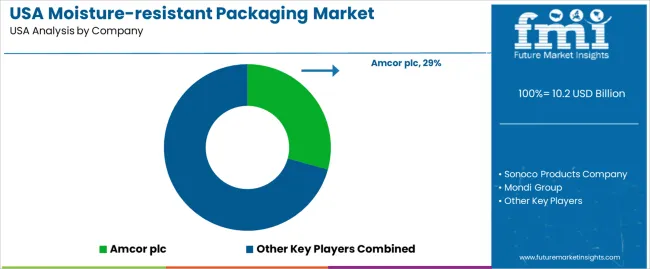
The demand for moisture-resistant packaging in the United States is increasing, driven by the need to protect products from environmental factors like humidity and moisture during storage and transportation. Companies like Amcor plc (holding approximately 29.3% market share), Sonoco Products Company, Mondi Group, Westrock Company, Smurfit Kappa Group plc, and DS Smith Plc are key players in this market. Moisture-resistant packaging is essential for industries such as food and beverage, pharmaceuticals, and electronics, where the integrity of the product must be maintained throughout the supply chain.
Competition in the moisture-resistant packaging industry is focused on material innovation, sustainability, and cost-efficiency. Companies are developing advanced packaging materials that provide superior moisture barriers, ensuring that products remain safe and fresh. Another competitive factor is the ability to offer sustainable packaging solutions that align with the growing demand for eco-friendly materials, such as biodegradable or recyclable moisture-resistant options. Companies are also focusing on customization, providing packaging solutions tailored to specific products and industries, including customized sizes, shapes, and moisture protection levels. Marketing materials often highlight features such as enhanced product protection, environmental benefits, and cost savings. By aligning their offerings with the growing demand for high-performance, sustainable, and protective packaging, these companies aim to strengthen their position in the U.S. moisture-resistant packaging market.
| Items | Details |
|---|---|
| Quantitative Units | USD Billion |
| Regions Covered | USA |
| Material | Glass, Plastic, Metal, Paper & Paperboard |
| Packaging Type | Bags and Pouches, Films, Bottles & Jars, Trays & Clamshells, Others |
| End Use | Food & Beverages, Pharmaceutical, Electrical and Electronics, Cosmetics & Personal Care, Chemical & Fertilizer, Other Consumer Goods |
| Key Companies Profiled | Amcor plc, Sonoco Products Company, Mondi Group, Westrock Company, Smurfit Kappa Group plc, DS Smith Plc |
| Additional Attributes | The market analysis includes dollar sales by material, packaging type, and end-use categories. It also covers regional demand trends in the USA, particularly driven by the increasing need for moisture-resistant packaging solutions across industries like food, pharmaceuticals, and consumer goods. The competitive landscape highlights key manufacturers focusing on innovations in moisture-resistant packaging materials and designs. Trends in the growing demand for sustainable and protective packaging solutions, along with advancements in barrier technologies for food and beverage applications, are explored. |
The global demand for moisture-resistant packaging in USA is estimated to be valued at USD 10.2 billion in 2025.
The market size for the demand for moisture-resistant packaging in USA is projected to reach USD 15.6 billion by 2035.
The demand for moisture-resistant packaging in USA is expected to grow at a 4.3% CAGR between 2025 and 2035.
The key product types in demand for moisture-resistant packaging in USA are glass, plastic market , metal and paper & paperboard.
In terms of packaging type, bags and pouches market segment to command 35.0% share in the demand for moisture-resistant packaging in USA in 2025.






Our Research Products

The "Full Research Suite" delivers actionable market intel, deep dives on markets or technologies, so clients act faster, cut risk, and unlock growth.

The Leaderboard benchmarks and ranks top vendors, classifying them as Established Leaders, Leading Challengers, or Disruptors & Challengers.

Locates where complements amplify value and substitutes erode it, forecasting net impact by horizon

We deliver granular, decision-grade intel: market sizing, 5-year forecasts, pricing, adoption, usage, revenue, and operational KPIs—plus competitor tracking, regulation, and value chains—across 60 countries broadly.

Spot the shifts before they hit your P&L. We track inflection points, adoption curves, pricing moves, and ecosystem plays to show where demand is heading, why it is changing, and what to do next across high-growth markets and disruptive tech

Real-time reads of user behavior. We track shifting priorities, perceptions of today’s and next-gen services, and provider experience, then pace how fast tech moves from trial to adoption, blending buyer, consumer, and channel inputs with social signals (#WhySwitch, #UX).

Partner with our analyst team to build a custom report designed around your business priorities. From analysing market trends to assessing competitors or crafting bespoke datasets, we tailor insights to your needs.
Supplier Intelligence
Discovery & Profiling
Capacity & Footprint
Performance & Risk
Compliance & Governance
Commercial Readiness
Who Supplies Whom
Scorecards & Shortlists
Playbooks & Docs
Category Intelligence
Definition & Scope
Demand & Use Cases
Cost Drivers
Market Structure
Supply Chain Map
Trade & Policy
Operating Norms
Deliverables
Buyer Intelligence
Account Basics
Spend & Scope
Procurement Model
Vendor Requirements
Terms & Policies
Entry Strategy
Pain Points & Triggers
Outputs
Pricing Analysis
Benchmarks
Trends
Should-Cost
Indexation
Landed Cost
Commercial Terms
Deliverables
Brand Analysis
Positioning & Value Prop
Share & Presence
Customer Evidence
Go-to-Market
Digital & Reputation
Compliance & Trust
KPIs & Gaps
Outputs
Full Research Suite comprises of:
Market outlook & trends analysis
Interviews & case studies
Strategic recommendations
Vendor profiles & capabilities analysis
5-year forecasts
8 regions and 60+ country-level data splits
Market segment data splits
12 months of continuous data updates
DELIVERED AS:
PDF EXCEL ONLINE
USA Stick Packaging Market Analysis – Growth, Trends & Forecast 2025-2035
USA Sachet Packaging Market Report – Trends, Demand & Industry Outlook 2025-2035
USA Blister Packaging Market Trends – Demand & Growth 2025-2035
USA Barrier Packaging Market Analysis – Trends & Forecast 2024-2034
USA Pharmaceutical Packaging Market Insights – Demand, Size & Industry Trends 2025-2035
Reusable Consumer Packaging Market
USA Flexible Plastic Packaging Market Insights – Trends, Demand & Growth 2025-2035
Reusable Cold Chain Packaging Market Size and Share Forecast Outlook 2025 to 2035
Evaluating Reusable Cold Chain Packaging Market Share & Provider Insights
Market Share Breakdown of USA and Canada Molded Fiber Pulp Packaging Manufacturers
Demand for Packaging Tubes in USA Size and Share Forecast Outlook 2025 to 2035
Europe & USA Consumer Electronics Packaging Market Size and Share Forecast Outlook 2025 to 2035
Demand for Boxboard Packaging in USA Size and Share Forecast Outlook 2025 to 2035
Demand for Bag-In-Box Packaging in USA Size and Share Forecast Outlook 2025 to 2035
Molded Fiber Pulp Packaging industry Analysis in USA and Canada - Size, Share, and Forecast Outlook 2025 to 2035
Packaging Supply Market Size and Share Forecast Outlook 2025 to 2035
Packaging Testing Services Market Size and Share Forecast Outlook 2025 to 2035
Packaging Tubes Market Size and Share Forecast Outlook 2025 to 2035
Packaging Jar Market Forecast and Outlook 2025 to 2035
Packaging Barrier Film Market Size and Share Forecast Outlook 2025 to 2035

Thank you!
You will receive an email from our Business Development Manager. Please be sure to check your SPAM/JUNK folder too.
Chat With
MaRIA